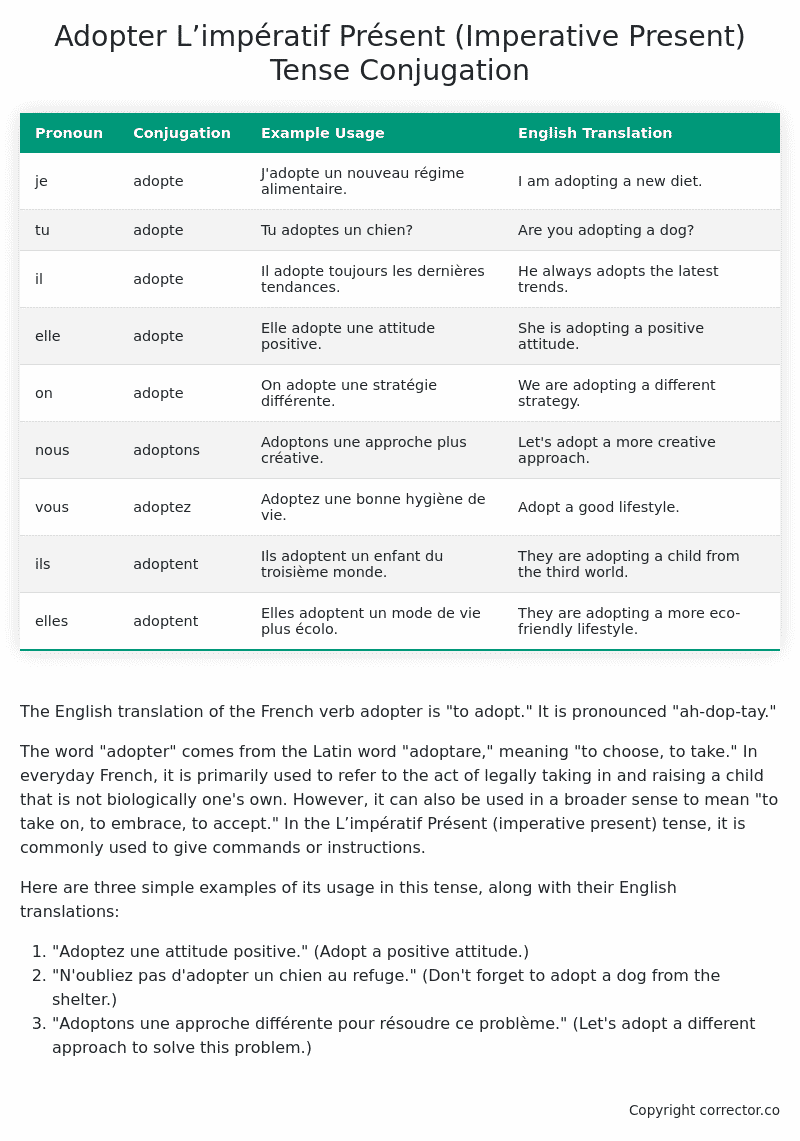L’impératif Présent (Imperative Present) Tense Conjugation of the French Verb adopter
Introduction to the verb adopter
The English translation of the French verb adopter is “to adopt.” It is pronounced “ah-dop-tay.”
The word “adopter” comes from the Latin word “adoptare,” meaning “to choose, to take.” In everyday French, it is primarily used to refer to the act of legally taking in and raising a child that is not biologically one’s own. However, it can also be used in a broader sense to mean “to take on, to embrace, to accept.” In the L’impératif Présent (imperative present) tense, it is commonly used to give commands or instructions.
Here are three simple examples of its usage in this tense, along with their English translations:
- “Adoptez une attitude positive.” (Adopt a positive attitude.)
- “N’oubliez pas d’adopter un chien au refuge.” (Don’t forget to adopt a dog from the shelter.)
- “Adoptons une approche différente pour résoudre ce problème.” (Let’s adopt a different approach to solve this problem.)
Table of the L’impératif Présent (Imperative Present) Tense Conjugation of adopter
| Pronoun | Conjugation | Example Usage | English Translation |
|---|---|---|---|
| je | adopte | J’adopte un nouveau régime alimentaire. | I am adopting a new diet. |
| tu | adopte | Tu adoptes un chien? | Are you adopting a dog? |
| il | adopte | Il adopte toujours les dernières tendances. | He always adopts the latest trends. |
| elle | adopte | Elle adopte une attitude positive. | She is adopting a positive attitude. |
| on | adopte | On adopte une stratégie différente. | We are adopting a different strategy. |
| nous | adoptons | Adoptons une approche plus créative. | Let’s adopt a more creative approach. |
| vous | adoptez | Adoptez une bonne hygiène de vie. | Adopt a good lifestyle. |
| ils | adoptent | Ils adoptent un enfant du troisième monde. | They are adopting a child from the third world. |
| elles | adoptent | Elles adoptent un mode de vie plus écolo. | They are adopting a more eco-friendly lifestyle. |
Other Conjugations for Adopter.
Le Present (Present Tense) Conjugation of the French Verb adopter
Imparfait (Imperfect) Tense Conjugation of the French Verb adopter
Passé Simple (Simple Past) Tense Conjugation of the French Verb adopter
Passé Composé (Present Perfect) Tense Conjugation of the French Verb adopter
Futur Simple (Simple Future) Tense Conjugation of the French Verb adopter
Futur Proche (Near Future) Tense Conjugation of the French Verb adopter
Plus-que-parfait (Pluperfect) Tense Conjugation of the French Verb adopter
Passé Antérieur (Past Anterior) Tense Conjugation of the French Verb adopter
Futur Antérieur (Future Anterior) Tense Conjugation of the French Verb adopter
Subjonctif Présent (Subjunctive Present) Tense Conjugation of the French Verb adopter
Subjonctif Passé (Subjunctive Past) Tense Conjugation of the French Verb adopter
Subjonctif Imparfait (Subjunctive Imperfect) Tense Conjugation of the French Verb adopter
Subjonctif Plus-que-parfait (Subjunctive Pluperfect) Tense Conjugation of the French Verb adopter
Conditionnel Présent (Conditional Present) Tense Conjugation of the French Verb adopter
Conditionnel Passé (Conditional Past) Tense Conjugation of the French Verb adopter
L’impératif Présent (Imperative Present) Tense Conjugation of the French Verb adopter (this article)
L’infinitif Présent (Infinitive Present) Tense Conjugation of the French Verb adopter
Struggling with French verbs or the language in general? Why not use our free French Grammar Checker – no registration required!
Get a FREE Download Study Sheet of this Conjugation 🔥
Simply right click the image below, click “save image” and get your free reference for the adopter L’impératif Présent tense conjugation!

Adopter – About the French L’impératif Présent (Imperative Present) Tense
Usage
Giving commands
Making requests
Offering advice
Expressing desires
Conjugation Formation
Interactions with other tenses
Want More?
I hope you enjoyed this article on the verb adopter. Still in a learning mood? Check out another TOTALLY random French verb conjugation!


